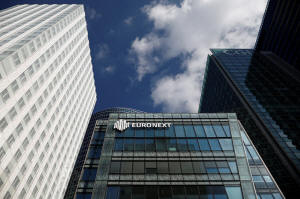European stocks fall as markets price in French political risk
 Send a link to a friend
Send a link to a friend
 [June 14, 2024] By
Elizabeth Howcroft [June 14, 2024] By
Elizabeth Howcroft
LONDON (Reuters) -European stocks fell on Friday as French stocks and
bonds took a battering from political turmoil, while elsewhere investors
weighed up the U.S. rates outlook after a week of mixed signals.
At 0934 GMT, the STOXX 600 was down 0.6% on the day. France's CAC 40 was
down 1.6%, plunging to its lowest since February.
President Emmanuel Macron's grip on power has weakened after left-wing
parties united against him, leaving market participants worried that the
far right, led by Marine Le Pen's Rassemblement National (RN), could win
the election and push a high-spending agenda.
France's finance minister said the country faces the risk of a financial
crisis if the far right were to win a snap election in the coming weeks.
The risk premium on French government bonds surged to its highest since
2017, and the spread between French and German 10-year government bond
yields was at 79.1 basis points.

"It is justified that some political risk is priced into French assets.
Markets are weighing the risks of an RN government, assuming more fiscal
slippage, nationalization risks, etc," said Amelie Derambure, Senior
Multi-Asset Portfolio Manager at Amundi in Paris.
But Derambure added that the risks are "very different from 2017"
because the RN is not talking about taking France out of the European
Union.
"That is a major difference," she said.
The euro was down 0.6% on the day at $1.067175, its lowest in more than
six weeks, in a move analysts said was due to the risk premium on
European markets following the European elections last weekend, where
gains by far-right parties dealt a blow to the leaders of France and
Germany.
WATCHING THE DATA
World stocks were down 0.2% on the day, having fallen since they hit an
all-time high earlier the week.
The U.S. Federal Reserve on Wednesday pushed back the expected start
date for its rate cuts. Fed Chair Jerome Powell said policymakers were
content to leave rates where they are until the economy sends a clear
signal that something else is needed.
[to top of second column] |

The Euronext stock exchange is pictured at the La Defense business
district in Paris, France, September 30, 2022. REUTERS/Benoit
Tessier/File Photo

But investors took confidence from cooler-than-expected producer
prices and consumer price data.
Weekly jobless claims in the U.S. hit a 10-month high as the labor
market cooled.
“It’s very likely that the last mile on the disinflation process
will require some weaker growth and weaker demand… the numbers that
we have seen this week are clearly going into that direction," said
Amundi's Derambure.
The U.S. dollar gained, with the dollar index up 0.4% at 105.63, on
track for a 0.6% weekly rise.
Elsewhere, the yen fell after the Bank of Japan said it would begin
trimming its huge bond purchases in the future, in a move
interpreted as signaling it was not in a hurry to do so soon.
The dollar gained as much as 0.8% to 158.255 on the yen, causing the
yen to touch its weakest in more than a month during Asian trading,
though it recovered in early European trading.
U.S. Treasury yields were down, with the benchmark 10-year yield
down 3 basis points at 4.2074%.
Euro zone government bonds were also down. Germany's 10-year yield
was at 2.373%, down 11.8 basis points on the day.
Oil prices eased, but crude benchmarks were still on track for their
best week in more than two months.
Gold was up 0.7% on the day at $2,320.18.
(Reporting by Elizabeth Howcroft; Editing by Angus MacSwan)
[© 2024 Thomson Reuters. All rights
reserved.]
This material may not be published,
broadcast, rewritten or redistributed.
Thompson Reuters is solely responsible for this content.
 |